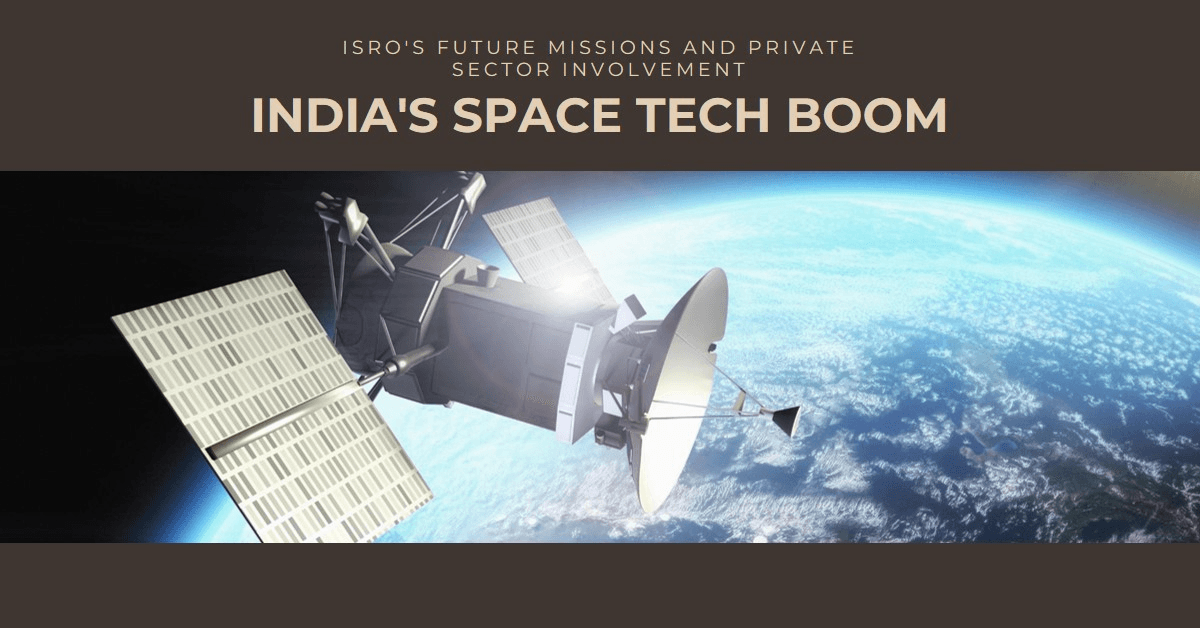India’s space industry is undergoing a significant transformation. Spearheaded by the Indian Space Research Organization (ISRO), the country’s space tech boom has captured global attention. While ISRO continues to achieve remarkable milestones, the involvement of private space tech companies is reshaping the landscape, enhancing India’s potential to become a major player in the global space market.
This article will analyze India’s growing space industry, examine ISRO’s future missions, and explore the evolving role of private space tech companies. We’ll also look at how this combined effort is driving India toward space leadership, backed by government support and increasing international collaborations.
The Rise of India’s Space Industry
India’s space journey began in the 1960s when ISRO was established. From launching its first satellite, Aryabhata, in 1975 to its historic Mars Orbiter Mission (Mangalyaan) in 2014, ISRO has consistently proven its capabilities. The Indian government’s significant investments in space technology have empowered ISRO to tackle challenging missions while keeping costs down, a feat recognized globally.
In recent years, India has become the leader in cost-effective space missions, offering launch services to multiple countries. The Polar Satellite Launch Vehicle (PSLV), known for its reliability, has placed hundreds of satellites in orbit, solidifying India’s reputation as a launch provider.
Learn more about ISRO’s PSLV
India’s success story is set to continue, with ambitious future missions and increasing participation from the private sector. The emergence of private space tech companies marks a new chapter in India’s space industry, paving the way for more innovation, collaboration, and growth.
ISRO’s Future Missions
ISRO has an ambitious lineup of missions aimed at strengthening India’s position in space exploration, satellite technology, and interplanetary research. Key missions include:
1. Chandrayaan-3: India’s Lunar Exploration Mission
Scheduled for 2024, Chandrayaan-3 is ISRO’s third lunar exploration mission. Unlike its predecessor, Chandrayaan-2, which faced challenges with the lander, Chandrayaan-3 is designed to focus solely on a successful soft landing on the moon. The mission aims to improve India’s understanding of the moon’s surface and contribute to global lunar research.
2. Gaganyaan: India’s First Manned Space Mission
India’s ambitious Gaganyaan mission, expected to launch in 2024 or 2025, aims to send Indian astronauts, or Vyomanauts, into space. This manned mission is a landmark event for India, showcasing the nation’s growing space capabilities. Gaganyaan will orbit Earth for several days, with a crew of astronauts trained in collaboration with Russia and other space agencies. This mission could lay the foundation for future manned space exploration and collaborations in international space projects.
3. Aditya-L1: India’s Solar Mission
The Aditya-L1 mission, ISRO’s first solar mission, is set to study the outermost layer of the sun, known as the corona. Aditya-L1 will be positioned at the Lagrange point 1 (L1), a point between the Earth and the Sun, providing uninterrupted views of solar activity. By studying the Sun’s atmosphere, solar winds, and magnetic fields, the mission aims to enhance our understanding of solar physics, with potential applications in space weather forecasting.
4. Mars Orbiter Mission 2 (Mangalyaan-2)
Following the success of Mangalyaan-1, ISRO is planning its second mission to Mars, Mangalyaan-2, with enhanced scientific payloads and more advanced instruments. This mission aims to deepen India’s exploration of Mars, focusing on its atmosphere, surface, and potential for past life. Mangalyaan-2 will reinforce India’s role in interplanetary research.
5. Shukrayaan-1: India’s Mission to Venus
Slated for the coming years, Shukrayaan-1 will be India’s first mission to Venus. ISRO aims to study Venus’ atmosphere, surface, and subsurface using a radar payload. As the closest planet to Earth, Venus holds many secrets about planetary evolution and climate patterns, making it a valuable research target for ISRO.
Private Sector Involvement in India’s Space Industry
While ISRO continues to dominate the Indian space industry, private space tech companies are playing an increasingly important role. The Indian government’s move to open up the space sector to private enterprises through the Indian National Space Promotion and Authorization Center (IN-SPACe) has catalyzed the involvement of startups and private firms.
Private companies are now working alongside ISRO, contributing to satellite launches, space research, and technological innovation. Some notable players include:
1. Skyroot Aerospace
Skyroot Aerospace, an Indian startup, became the first private company to test its Vikram-I rocket engine in 2021. The company is working on developing India’s first privately built rocket, expected to launch small satellites into space by 2024. Skyroot’s goal is to provide cost-effective solutions for launching small payloads, catering to the rapidly growing demand for satellite launches from commercial entities globally.
2. Agnikul Cosmos
Agnikul Cosmos is another Indian space tech startup developing 3D-printed rocket engines and small launch vehicles. Their Agnibaan rocket, capable of launching small satellites into Low Earth Orbit (LEO), is expected to be fully operational by 2024. Agnikul’s innovations could significantly reduce the cost and complexity of space launches, making space more accessible to a wide range of customers.
3. Pixxel
Pixxel is a Bengaluru-based startup that aims to build a constellation of earth-imaging satellites. By using advanced imaging technology, Pixxel’s satellite network will provide high-resolution images for applications such as agriculture, disaster management, and climate monitoring. The startup’s partnership with ISRO to launch their first satellite on a PSLV rocket highlights the growing synergy between the public and private sectors in space.
4. Dhruva Space
Dhruva Space, a Hyderabad-based company, is focused on developing small satellites and satellite systems for commercial and defense purposes. They offer end-to-end solutions, including satellite design, launch services, and ground station support. The company’s growing expertise is expected to play a crucial role in strengthening India’s presence in the global satellite market.
Discover more about India’s Private Space Sector
Government Support and Policy Reforms
The Indian government has recognized the importance of fostering innovation and competition within the space industry. The establishment of IN-SPACe and the NewSpace India Limited (NSIL) has opened up new opportunities for private sector participation. NSIL acts as the commercial arm of ISRO, focusing on the transfer of ISRO-developed technologies to private firms, while IN-SPACe serves as a regulatory body that encourages private sector collaboration with ISRO.
The Spacecom Policy 2020 and the Draft Space Activities Bill are aimed at further easing regulations for private companies and encouraging them to develop their space capabilities. These reforms are crucial for India’s goal of increasing its share in the global space economy, currently valued at over $440 billion.
Read more about Emerging Technologies in India
Global Collaborations and International Market
India’s space ambitions are not limited to domestic projects. ISRO and private companies are actively seeking collaborations with international space agencies and organizations. For instance, India’s Gaganyaan mission involves cooperation with NASA and the Russian Space Agency. Additionally, ISRO has signed numerous Memoranda of Understanding (MoUs) with foreign space agencies, expanding opportunities for joint missions, satellite launches, and technology sharing.
India’s reputation as a low-cost satellite launch provider is also attracting commercial customers worldwide. With the PSLV and upcoming private sector rockets, India is well-positioned to meet the rising demand for satellite launches in the international market.
Explore International Space Collaborations
Challenges Facing India’s Space Tech Boom
Despite the progress, challenges remain. One of the main hurdles is the lack of adequate infrastructure for large-scale private sector participation. While ISRO has an extensive launch and testing infrastructure, private companies need access to similar resources to conduct independent missions. Moreover, space debris is becoming a growing concern, with the increasing number of satellites being launched globally. Addressing these issues will require careful planning, international cooperation, and sustainable policies.
Another challenge is funding. Space exploration is capital-intensive, and while government funding has been strong, private companies will need significant investments to sustain long-term growth. Venture capital and foreign investments are slowly entering the market, but a more robust funding ecosystem is required to fuel innovation.
Conclusion
India’s space tech boom is the result of decades of dedication, scientific breakthroughs, and strategic government support. ISRO’s future missions, such as Chandrayaan-3, Gaganyaan, and Shukrayaan-1, along with the emerging role of private space tech companies like Skyroot Aerospace, Agnikul Cosmos, and Pixxel, underscore India’s ambitions for space leadership.
The collaborative ecosystem between public and private entities promises to drive India’s space sector to new heights, with implications for industries ranging from telecommunications to agriculture and beyond. The road ahead is filled with opportunities for innovation, international cooperation, and economic growth.
As the world watches India’s ascent into space, the nation’s determination to achieve new milestones will inspire a new generation of space scientists, entrepreneurs, and dreamers. The future of space exploration in India is bright, and the possibilities are endless.










